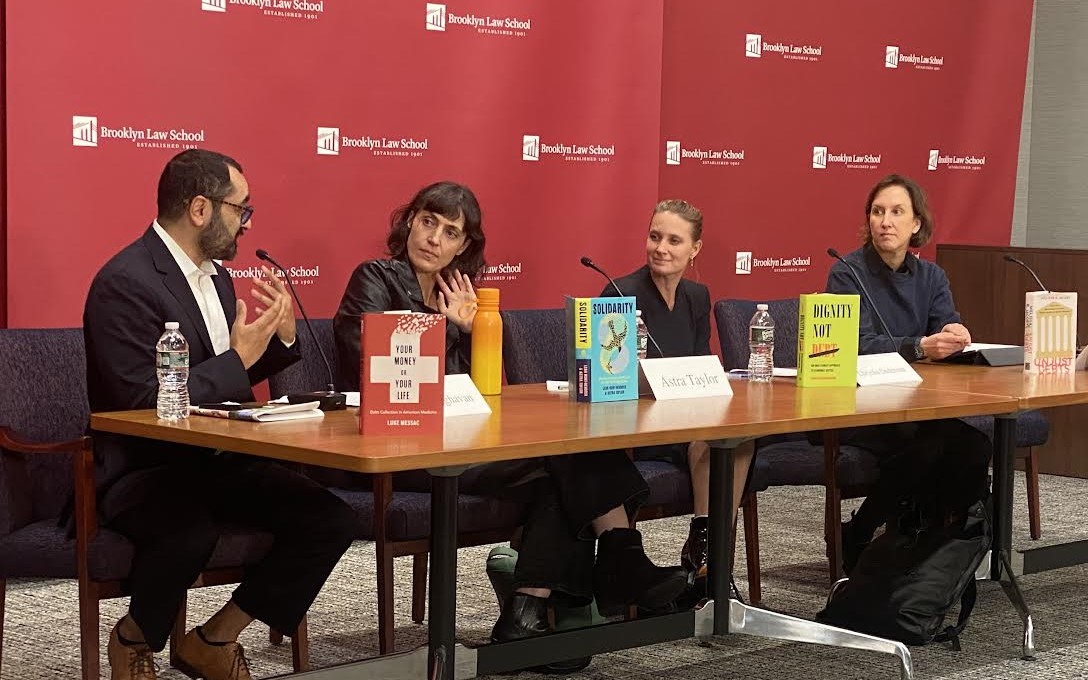Brooklyn Book Festival Panel Focused on Change of Course for Consumers Overwhelmed by Debt

As part of the Brooklyn Book Festival on Sunday, Professor Vijay Raghavan moderated a panel of authors whose books are focused on the legal, political, and economic forces shaping debt markets and who made arguments for changing those forces, including through the abolition of debt.
Once again, Brooklyn Law School opened its doors as a host venue for the annual book festival, with a series of discussions held throughout the day in the Moot Court Room and Student Lounge. Capping off the day was the wide-ranging panel on debt, which featured Chrystin Ondersma, a law professor at Rutgers Law School and author of Dignity Not Debt: An Abolitionist Approach to Economic Justice; Melissa Jacoby, a law professor at the University of North Carolina School of Law and author of Unjust Debts: How Our Bankruptcy System Makes America More Unequal; and Astra Taylor, who is co-author of Solidarity: The Past, Present, And Future Of A World-Changing Idea as well as a writer, documentary filmmaker, and founder of the Debt Collective.
The panelists’ wide-ranging discussion included student loan forgiveness efforts, racial disparities in lending that have led to inequity for Black would-be homeowners, the Occupy Wall Street movement, and corporate bailouts.
Ondersma said her book is focused on “household debt” and that she avoids the term “consumer debt,” because there is a sense of blame and shame attached to the latter, which is intertwined with the “myth” that people get into debt because they are frivolously racking up debt on luxury goods and then “strategically filing for bankruptcy.”
That myth has led to a legislative history of amendments to the bankruptcy code that have made it harder for people and households who are in debt to get relief, she asserted.“A lot of debt that people have is something they incurred because they had no choice,” Ondersma said. “It’s because of a medical emergency, or, to pay for an education in order to get a job that pays a living wage.”
In Ondersma’s book, she produced a taxonomy of debt that she hopes will help policymakers consider more of an abolitionist approach to what she calls “survival debt” and “extractive debt.”
“Survival debt is debt that households incurred to survive and achieve a standard of living consistent with human dignity. Examples include medical debt, a payday loan incurred to avoid having utilities shut off, groceries bought on a credit card when income falls short, and debt incurred to acquire an education sufficient to earn a living wage,” she said. “Extractive debt is debt that primarily benefits somebody other than the borrower, and is, in fact, substantially likely to harm the borrower. This includes predatory loans, high-interest loans, payday loans, high-cost subprime credit cards, subprime mortgages, and high-cost private student loans.”
By contrast, she said, people should be responsible for repaying the other type of debt, “opportunity debt,” which is debt used to expand resources or opportunities, such as buying a new car or washing machine.
The Debt Collective, which Taylor cofounded after getting involved in the Occupy Wall Street movement, is a coalition consisting of people in debt who have come together in the style of a labor union to exercise economic power as a group. She tied the debt owed by individuals to the wider issue of wealth inequality.
“I think the power of organizing around debt is that it very easily gets us to the question of, why are we in debt?” Taylor said. “One of the Debt Collective’s phrases is, you are not in debt because you live [beyond] your means, but because you are denied the means to live. We have student debts we cannot pay because there’s not free college. We have medical bills we cannot pay because we do not have universal health care. We are putting our rent and our essentials on credit cards and payday loans because we are underpaid at the job. So, we are robbed twice by our bosses who underpay us, and then by our creditors who get to lend money to us and seize that opportunity.”
Jacoby, whose book discusses the American bankruptcy system, asserted that while it is often held up as a model for the world, part of what our national system teaches others is what not to do.
“The American bankruptcy system has become a place where the most important thing it can do, which is cancel debt and provide debt relief for financially distressed families, has become too difficult and too expensive, and I want to be clear that this is on a bipartisan basis,” Jacoby said, adding that the U.S. Congress, state legislatures, appellate courts and the Supreme Court have each played a role in shaping formal bankruptcy law. In addition, she said, lawyers and other institutions have “informally” shaped bankruptcy law in a way that has deepened inequality in how the laws are applied.
“There are layers of other sources of inequality that are harder to track, that come from the exercise of discretion, so that a human is treated differently than a big corporation, a white family is treated differently than a Black family through a variety of different sort of portals in the system,” Jacoby said. She also said that cancelling debt is not as radical as it sounds, nor is it unprecedented in U.S. history.
“Certainly, we know that financial institutions and big corporations have gotten relief when they have asked, and it’s really important to look at that history,” Jacoby said.